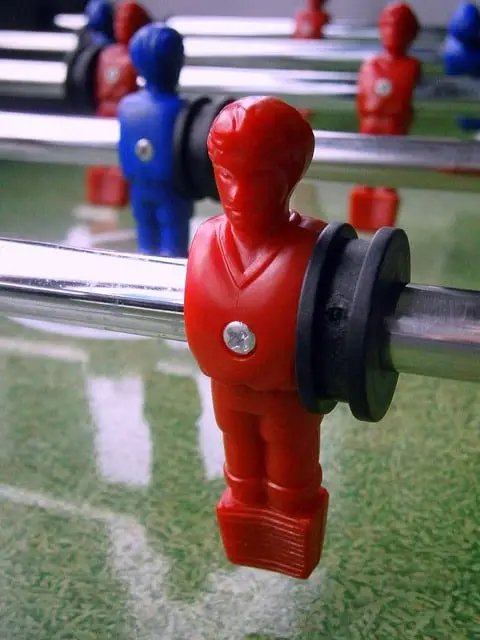Spinning the rods in foosball is not allowed in many official tournaments and game rooms because it is considered a form of cheating. Spinning involves rotating the rods at a high speed, which can disrupt the flow of the game and make it difficult for the opponent to control the ball. Additionally, spinning can cause the ball to spin rapidly, making it difficult to predict its movement and direction.
Moreover, spinning the rods can also cause damage to the foosball table, as the friction generated by the rapid rotation can wear down the bearings and damage the rods. This can lead to costly repairs and can shorten the lifespan of the table.
Therefore, it is considered good etiquette to avoid spinning the rods in foosball, and many game rooms and tournament organizers have rules in place prohibiting this behavior. If you are playing in a tournament or in a game room, it is important to follow the rules and to refrain from spinning the rods to ensure fair play and to protect the longevity of the foosball table.
Spinning in foosball explained
No spinning is quite literally the first rule often listed in official foosball rules. It is defined by the International Table Soccer Federation (ITSF) as “the rotation of any soccer figure more than 360 degrees before or more than 360° after striking the ball.“
Spinning in foosball is a technique where a player rotates the foosball rods rapidly to create more spin on the ball. This can be done by twisting the rod quickly with one or both hands, or by flicking the rod with a wrist or finger movement so that the rod(s) turn repeatedly in a 360° motion before or after striking the ball.
Spinning the rods allows a player to generate more power and control on their shots, but it also requires a lot of skill and practice to execute accurately. While some players may prefer to use spinning as a way to add variety to their game, others may feel that it takes away from the strategy and skill involved in foosball.
In many foosball tournaments and organized leagues, spinning is not allowed as it is seen as an unfair advantage. However, in casual or informal games, spinning may be permitted if both players agree to allow it.
Regardless of whether spinning is allowed or not, it is important for all players to abide by the rules of the game and respect the preferences of their opponents. Good sportsmanship and proper foosball etiquette are crucial for a fun and enjoyable experience for everyone involved.
Why spinning isn’t allowed in foosball
First off, if you own a home foosball table you can of course play by whichever rules you like. In tournaments however, spinning isn’t allowed and you might find that this rule is extended to arcades or other public foosball tables you might play on. So it’s best to get skilled without spinning for these reasons alone.
While the ITSF doesn’t actually say why spinning isn’t allowed, there are a few reasons that it makes sense to ban the move:
- Unfair advantage: Spinning the rods can give players an unfair advantage, as they can move the ball more quickly and unpredictably.
- Damages the table: Spinning the rods at high speeds can put a lot of stress on the table and its components, potentially causing damage to the rods, bearings, and other parts. The integrity of the table can be compromised and damaged especially if the table is of low quality and not built very well.
- Unsafe: Spinning the rods can be dangerous to other players, as the rods can fly off the table and hit someone.
- Slows down play: Spinning the rods can slow down the game, as other players may have to wait for the spinner to stop before continuing play.
Therefore, many foosball organizations have banned spinning in order to maintain a level playing field and prevent damage to the table and its components.
Whether or not you allow it in your home is another story as it’s your home and your rules.
Do this instead of spinning
One thing to remember: You can still quickly spin your players with full hand control and score unexpected goals on your opponents and not violate the no spin rule.
If you wish to spin a rod quickly without breaking the rule, one option is to use a wrist shot.
This technique involves using a quick wrist flick to generate spin on the ball. It is important to note that even though wrist shots are considered legal, excessive spinning is still not allowed and can result in a foul being called.
It’s always best to familiarize yourself with the specific rules and regulations of any foosball game you plan to participate in that is outside your home, to ensure fair and respectful play.


